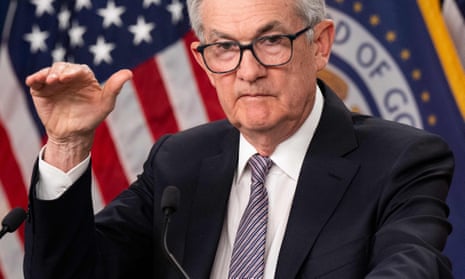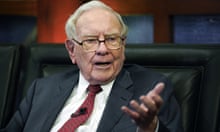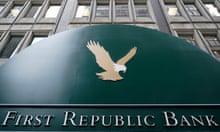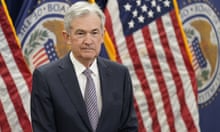Trading in the shares of two more regional US lenders was temporarily suspended on Thursday amid a widening crisis for the country’s mid-sized banks.
Regulators stepped in to halt trading in the Los Angeles-based PacWest and Arizona’s Western Alliance following dramatic drops in their share prices.
It came after another mid-sized bank, First Republic, was sold to JP Morgan earlier this week. Depositors had pulled $100bn from First Republic, fearing their money was no longer safe.
PacWest had sought to calm markets on Wednesday and said it was in talks with several potential investors after its shares fell by as much as 60%. But the sell-off continued on Thursday and affected other regional banks.
Shares in PacWest fell 50% on Thursday after Bloomberg News reported that the lender was considering strategic options, including a sale or a fundraising round.
The bank sought to reassure investors by saying it had not experienced unusual deposit flows. “Recently, the company has been approached by several potential partners and investors – discussions are ongoing,” it added.
Western Alliance’s share price plummeted 45% after the Financial Times reported it was exploring strategic options, including a potential sale, which the bank strongly denied. It called the story “absolutely false” and said it had not experienced unusual deposit flows after the sale of First Republic. Its shares ended Thursday down 38%
First Republic was the third US bank failure to be swept up in the crisis, the worst since 2008, after the collapse of Silicon Valley Bank and Signature in March.
Bill Ackman, chief executive of the New York hedge fund Pershing Square, warned that the entire US regional banking system was at risk. In a tweet before PacWest’s statement, he wrote: “Confidence in a financial institution is built over decades and destroyed in days. As each domino falls, the next weakest bank begins to wobble.
“We are running out of time to fix this problem. How many more unnecessary bank failures do we need to watch before the FDIC [Federal Deposit Insurance corporation], and our government wake up? We need a systemwide deposit guarantee regime now.”
The regional banking system is at risk. SVB's depositors' bad weekend woke up uninsured depositors everywhere. The rapid rise in rates impaired assets and drained deposits. Zeroing out shareholders and bondholders massively increased the banks’ cost of capital. CRE losses loom.…
— Bill Ackman (@BillAckman) May 3, 2023
PacWest said total deposits were $28bn (£22.2bn) as of Tuesday. “Our cash and available liquidity remains solid and exceeded our uninsured deposits,” it said.
A PacWest branch in Glendale, a city outside Los Angeles, was open, quiet, and mostly empty on Thursday afternoon, with no visible signs of disturbance. A single customer consulted with a bank staffer at a desk. Employees chatted with each other, and, when asked for comment on the bank’s situation, provided a number for a company spokesperson.
Outside the branch, Erwin Lee, from Los Angeles, said he had just opened a CD account with the bank that day, and was not worried about the news stories on PacWest’s status, particularly because his new account was FDIC insured.
“People are worrywarts, I guess, and they shouldn’t be,” Lee said, adding that he trusted the Biden administration to protect bank customers, particularly after the federal government stepped in after the failure of Silicon Valley Bank.
after newsletter promotion
“The president will cover it no matter what,” Lee said. “They don’t want to see other banks fail or people start withdrawing money.”
This is a branch of Pacific Western Bank in Glendale, which I visited a few minutes ago. It was extremely placid and mostly empty. I saw one customer who told me he had just opened a new CD account and was not worried at all. pic.twitter.com/AAHz8EYabA
— Lois Beckett (@loisbeckett) May 4, 2023
Other, less well-known regional banks have also been affected. Shares in the Dallas-headquartered Comerica were down 13%, and Zions Bancorporation fell by about 16% on Thursday. Unlike in the UK, smaller, regional banks play a big role in the economy, accounting for nearly half of US consumer and business lending.
The sell-off came despite reassurances from the chair of the Federal Reserve, Jerome Powell, that the US banking system remained “sound and resilient”, after the central bank voted to raise interest rates to a 16-year high. The benchmark interest rate is now at a range of 5-5.25%.
On Monday, JP Morgan, the biggest US bank, stepped in to acquire a majority of First Republic’s assets in a $10.6bn deal after regulators seized the lender, which became the largest US bank failure since 2008. It was the second largest collapse in US banking history, beaten only by the 2008 demise of Washington Mutual, which was also sold to JP Morgan.
“You can’t ask JP Morgan to come to the rescue again,” said Neil Wilson, the chief markets analyst at the trading platform markets.com. He pointed out that Powell had said: “It’s probably good policy that we don’t want the largest banks doing big acquisitions.”
Wilson added: “No, but that is what happened, because it was the ‘best’ outcome for the banking system … The quicker the Fed gets to a point of cutting rates, the better for these mid-size banks, but there is a lot more time and likely a lot more pain before we get there.”










